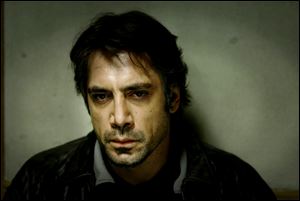
Bardem's 'Biutiful' performance is unforgettable
6/30/2011
Javier Bardem in Mexican filmaker Alejandro Gonzalez Inarritu's 'Biutiful.'
If I were an Academy Awards voter, I'd have trouble ranking one superlative performance over another.
I was thinking of this dilemma while watching Javier Bardem in Mexican filmmaker Alejandro Gonzalez Inarritu's Biutiful (2010), which is out on DVD (Lionsgate, $27.98/$39.99 Blu-ray, rated R, spoken in Spanish with English subtitles).
Taking nothing away from Colin Firth and the Best Actor Oscar he won for the feel-good movie The King's Speech, it was a far different type of performance than Bardem's Oscar-nominated work in the feel-bad Biutiful.
Where The King's Speech examined the birth of a monarch -- how he found his voice and his calling -- Biutiful is concerned with the looming death of a low-level gangster. While I admired Firth's work as the man who would become King George VI, and director Tom Hooper's big-picture look at the British monarchy, Bardem's performance in Inarritu's small-scale film, set in the slums of Barcelona, left me devastated.
It's not as if Bardem, a Supporting Actor Oscar-winner for 2007's No Country for Old Men, and Biutiful received no recognition. In addition to his Oscar nomination, Bardem won the Best Actor award at the Cannes Film Festival, and Inarritu's film, a Mexico-Spain co-production, received an Academy Award nomination for Best Foreign-Language Film (losing to Denmark's In a Better World). But Biutiful's difficult subject matter, considerable length (147 minutes) and methodical pace make the film a hard sell, particularly in this country, where most movies spoken in languages other than English have not fared well in recent years.
Bardem stars as Uxbal, a man raising his 10-year-old daughter, Ana (Hanna Bouchaib), and 7-year old son, Mateo (Guillermo Estrella), largely by himself, as his estranged wife, Marambra (Maricel Alvarez), suffers from bipolar disorder and only recently has been released from a mental hospital. Uxbal barely has enough money to put food on his own family's table (fried fish and breakfast cereal for dinner), even though he's involved in a variety of illegal activities involving undocumented immigrants.
Nevertheless, Uxbal seems to be a decent man. He's loving, sweet, and protective with his children, compassionate toward his difficult wife and actually cares about the lives of the immigrants he's exploiting.
Uxbal also has a secret he's trying to keep from those closest to him: He's got cancer, which has spread from his prostate to his bones and liver, leaving him with only a few months to live. Yet even as he tries to set things right in the short time he has left, by arranging a trip to the Pyrenees mountains with his wife and kids and by purchasing heaters for the Chinese workers who live in his warehouse, his noblest plans and actions go terribly wrong.
Director Inarritu, who elicited terrific performances from his casts in the English-language movies (Babel and 21 Grams) for which he is best known in this country, wrote the part of Uxbal with Bardem in mind. As Inarritu told the New York Times, "Physically, Javier possesses an attraction that is tremendously magnetic and kinetic. On the one hand, he has the primitive force of the minotaur, the strength of a bull crossed with a man, along with a face that contains the essence of the Mediterranean, that looks like it could be that of a Caesar on a Roman coin. But he also has the sensibility of a poet, an inner subtlety and emotional baggage, and it is those two sets of qualities that made him so particularly fitting to play this character."
Inarritu also is gifted in working with non-professional actors. In her first work as a screen actress, Hanna Bouchaib, the young girl who plays Ana, Uxbal's daughter, demonstrates the ability to break the hardest of hearts. As we learn in the DVD special feature Behind 'Biutiful': Director's Flip Notes, a collection of Inarritu's behind-the-scenes video footage and audio-diary notes, all of those cast as Chinese and African immigrants actually experienced many of the things they portray in the film. This gives Biutiful a profoundly realistic and truthful sensibility.
But ultimately, Biutiful triumphs because of Bardem. While his mournful face conveys a lifetime of seeing too much misery and sadness, it also reveals tremendous warmth and compassion.
Biutiful is undeniably sad and depressing. Yet viewers who appreciate serious, grown-up films about the human condition will see haunting images that are not easily forgotten or pushed aside, and a performance by Bardem that is nothing short of unforgettable.